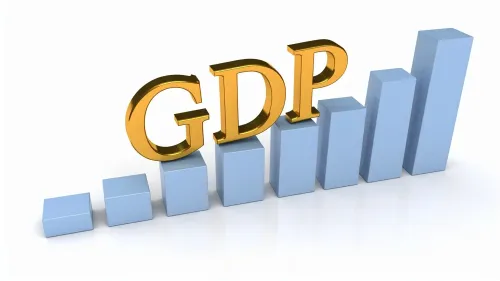Sensex and Nifty Decline as Trump's Tariffs Spark Global Market Turmoil

Synopsis
Key Takeaways
- Sensex down 470 points, Nifty down 105 points.
- Midcap and smallcaps showing minor gains.
- Auto, IT, and Media sectors among the biggest losers.
- Foreign investors continue to sell while domestic investors buy.
- Analysts warn of potential recession risks due to tariffs.
Mumbai, April 3 (NationPress) Indian equity indices began the day on a negative note on Thursday, following a significant decline in global markets triggered by US President Donald Trump's announcement regarding reciprocal tariffs.
As of approximately 9:20 AM, the Sensex had dropped by 470 points, or 0.61%, reaching 76,197, while the Nifty fell by 105 points, or 0.45%, settling at 23,227.
During the early trading session, midcap and smallcap stocks displayed slight gains compared to largecap stocks. The Nifty Midcap 100 index rose by 125 points, or 0.24%, to 52,183, and the Nifty Smallcap 100 index increased by 121 points, or 0.75%, to 16,283.
Sector-wise, the Auto, IT, PSU Bank, FMCG, Metal, and Media sectors were among the worst performers, while Pharma, Realty, and Energy sectors experienced notable gains.
Within the Sensex roster, companies such as Infosys, HCL Tech, TCS, Tech Mahindra, Tata Motors, M&M, Bharti Airtel, Reliance, HDFC Bank, Maruti Suzuki, and Kotak Mahindra Bank faced significant losses. Conversely, Sun Pharma, Power Grid, NTPC, Bajaj Finance, Bajaj Finserv, Titan, and UltraTech Cement were among the major gainers.
Vikram Kasat, Head of Advisory at PL Capital-Prabhudas Lilladher, warned, "Large tariff shocks pose a risk of a recession in the US and globally. If these policies are prolonged, they are likely to push both the US and global economies into recession this year."
He further explained, "In general, Canada and Mexico have been relatively unaffected, whereas nations in Asia, notably China and Vietnam, have experienced significant impacts. The European Union and Japan are somewhere in between. The hope is that no one retaliates, as retaliation could lead to escalation. If no retaliation occurs, this is the highest point we can reach."
Most Asian markets were affected by heavy selling due to US tariffs, with markets in Tokyo, Shanghai, Hong Kong, Bangkok, and Seoul trading in the red. The US markets, however, closed in positive territory during Wednesday's trading session.
On the institutional front, foreign institutional investors (FIIs) continued their selling trend for the third consecutive session on April 2, offloading equities worth ₹1,538 crore. In contrast, domestic institutional investors (DIIs) remained net buyers for the fourth consecutive day, acquiring equities valued at ₹2,800 crore.









